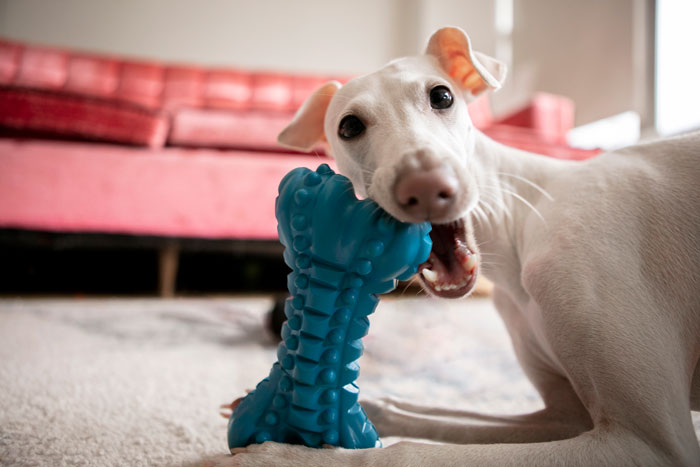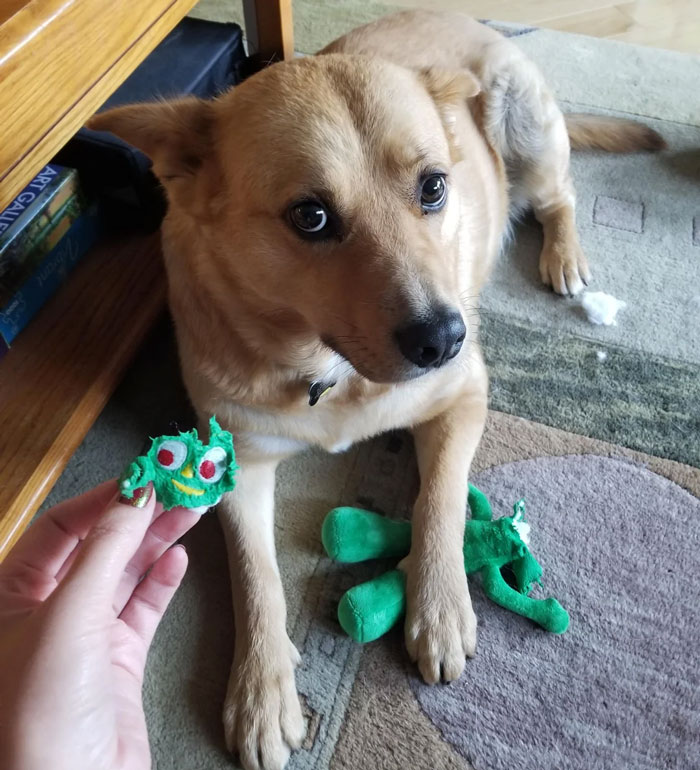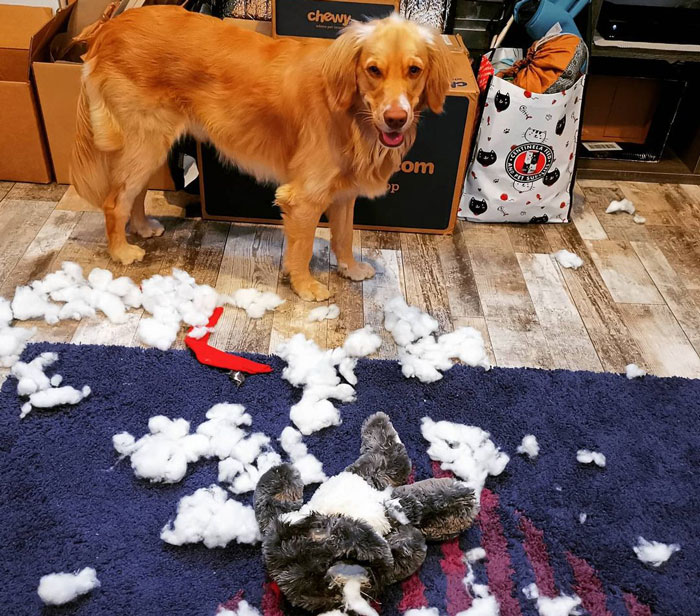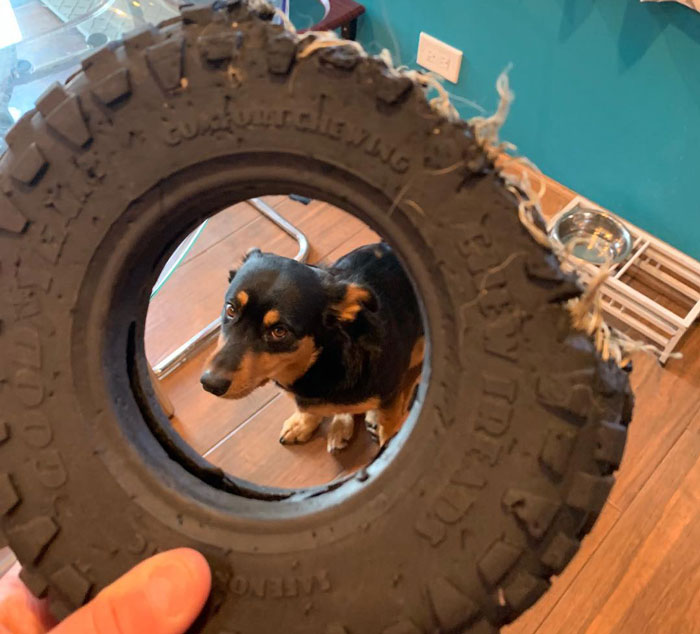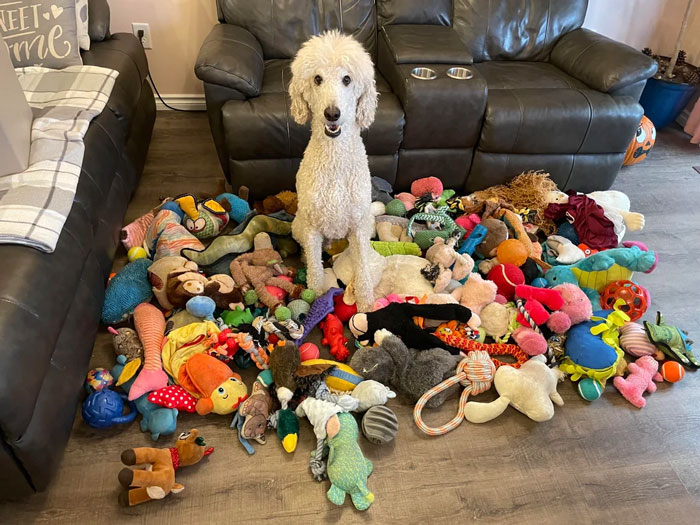Understanding why your furry friend engages in this behavior is the first step to keeping them safe. This article will explore the reasons behind toy destruction and provide you with practical solutions to redirect your dog’s chewing enthusiasm.
Why Do Dogs Eat Toys?
Share iconImage credits: freepik Dogs chew on toys for several instinctual and behavioral reasons.
Boredom and Lack of Stimulation
When your dog lacks enough exercise or playtime, they’ll start looking for ways to entertain themselves. According to a study, dogs lose interest in toys due to habituation to the overall stimulus properties of the toy. This can lead to destructive behaviors like chewing and eating toys out of sheer anxiety and pent-up energy.
Curiosity and Exploration
Young puppies use their mouths to learn about the world around them. Stuffed animals, with their different textures, sounds, and smells, are especially tempting for curious pups to explore and chew on.
Teething Discomfort
Just like human babies, puppies experience sore gums when their adult teeth come in. They may chew on toys to relieve the pressure and discomfort of teething.
Underlying Medical Reasons
Sometimes, eating toys indicates health problems. Pica, a disorder involving eating non-food items, could be caused by a nutritional deficiency. Stress, anxiety, or hormonal issues may also trigger destructive chewing behaviors in dogs.
Is It Bad For Dogs To Eat Toys?
Share iconImage credits: Seeyoulateraviator Yes, dogs eating toys can absolutely be harmful and sometimes even life-threatening. Here are the potential dangers:
Choking Hazards
Toy pieces, particularly those from squeaky toys or stuffed animals, can easily lodge in your dog’s throat, creating a choking hazard. This is an emergency situation requiring immediate veterinary attention. If ingested piece has sharp edge, it can tear the digestive tract.
Intestinal Blockages
Swallowed toy parts may not always pass smoothly. They can clump together in the stomach or intestines, leading to a blockage or obstruction. This blockage can prevent food from moving through the digestive system, causing severe health problems and requiring surgery.
Ingestion of Toxins
Sadly, some toys are made with materials that could be toxic to your dog. Ingesting these toys can lead to poisoning, causing various health issues. According to a study, toy and training devices made of plastics can leach endocrine-disrupting chemicals into pet dogs’ saliva, potentially affecting their health.
Signs That Your Dog Ate A Stuffed Toy (or Another Toy)
Share iconImage credits: julius.chow It’s crucial to be vigilant since dogs won’t always tell you directly if they’ve eaten something they shouldn’t. Here are the key signs to watch out for:
Vomiting: Repeated attempts to throw up, especially if nothing is coming up or if toy pieces are visible in the vomit, indicate a possible blockage. This requires immediate veterinary attention.Diarrhea: While diarrhea can be caused by various things, if it occurs suddenly in a previously healthy dog, along with potential toy ingestion, it might signal intestinal irritation or a partial blockage.Lethargy: Unusual tiredness, listlessness, and a reluctance to play could indicate that your dog is feeling unwell. If this is accompanied by other symptoms, it’s definitely a cause for concern.Changes in appetite: A sudden decrease in appetite or complete refusal to eat can point to digestive issues or a blockage. Watch carefully for this sign after a potential toy-eating incident.Pieces of toy visible in stool or vomit: This is the most obvious confirmation that your dog has swallowed parts of a toy. Even if your dog seems fine, contact your veterinarian for advice.Abdominal Pain: You may notice your dog whines when you touch their stomach, or adopt a hunched or “prayer” position to try and relieve discomfort. This is a sign they need to be seen by a vet.
Important: If you suspect your dog has eaten a foreign object like toy, don’t try to induce vomiting at home. Contact your veterinarian immediately for guidance and instructions on how to proceed.
What to Do If Your Dog Ate a Toy
Share iconImage credits: alwaysajedi Discovering your dog has eaten a toy is stressful. Here’s how to handle the situation:
Stay calm: Panic won’t help your dog. Try to collect as much information as you can about the incident to relay to your veterinarian.Assess the situation: What type of toy did your dog eat? How much might have been ingested? The more information you have, the better your vet can advise you.Contact your veterinarian immediately: Don’t wait for symptoms to worsen. Call your veterinarian to examine and treat your dog. No one knows your dog better than your veterinarian. They’ll advise you whether to bring your dog in for an exam or monitor them at home. They’ll diagnose your dogs and may do X-ray to better understand the situation.Monitor your dog: Even if your vet recommends observation, pay close attention. Watch for any signs of discomfort, vomiting, diarrhea, or changes in behavior, and report them immediately.
Preventing Your Dog From Eating Toys
Share iconImage credits: Due-Illustrator-7999 The best way to deal with toy destruction is to prevent it from happening in the first place. Here are some key strategies:
Supervision and toy management: Supervise your dog during playtime, especially if they have a history of destroying toys. Put toys away when you can’t keep an eye on your pup.Appropriate and durable chew toys: Choose toys designed for your dog’s size and chewing style. Tough rubber toys, chew bones, and puzzle toys are good toy options for power chewers.Training: Teach your dog commands like “leave it” and “drop it.” This helps you redirect their chewing and interrupt them if they go for a forbidden item.Adequate exercise and mental stimulation: A tired dog is less likely to be destructive! Provide daily walks, playtime, and mentally engaging activities like food puzzles or training sessions.Address any underlying medical issues: If you suspect your dog’s chewing habit is related to an underlying condition like pica or anxiety, work with your veterinarian to develop a treatment plan.
Additional Tips on Dogs Eating Toys
Want even more ways to curb destructive chewing? Try these additional tips: Rotating toys: Swap out your dog’s toys regularly. This keeps things exciting, reducing boredom and the likelihood of focusing on destruction. Bitter deterrents: Apply a pet-safe bitter spray (found at most pet stores) to toys to make them less appealing to chew. Designated safe space (crate training): If your dog is prone to destructive chewing when unsupervised, a crate or a designated safe space can be helpful. Provide appropriate chew toys within this space.
Conclusion
Dogs eat toys for a variety of reasons – from boredom, exploration, and teething discomfort, to deeper medical concerns. Understanding the “why” is the first step towards finding the right solutions and keeping your furry friend safe. By providing appropriate toys, adequate stimulation, supervision, and training, you can redirect your dog’s chewing habits. Remember, if you’re ever concerned about your dog’s destructive behavior or health, don’t hesitate to consult your veterinarian. They are your best partner in ensuring your dog’s well-being. Anyone can write on Bored Panda. Start writing! Follow Bored Panda on Google News! Follow us on Flipboard.com/@boredpanda!
